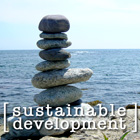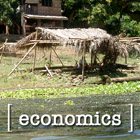
|
HANDICAPPING FOR NUCLEAR POWER Petroleum is a finite resource, a "fossil" fuel that cannot be replaced when existing volume has been exhausted. Coal, another carbon-based fossil, is so sooty, it cannot burn cleanly —though "clean cloal technology" may produce less noxious fumes than the standard coal-fired plant, it still contaminates far more than other means of power generation. Brazil is fortunate to have the land and climate for producing highly efficient sugarcane-based ethanol —though forest degradation is a by-product of much of the cutting done to uncover new expanses of arable land—, and is developing an automotive economy in which all new cars will soon have the ability to run on either ethanol or gasoline and to switch between them. This is already a widespread trait of Brazilian automobiles, because the 1980s saw a near total switch to ethanol when gasoline prices became prohibitive. Other nations are exploring alternative biofuels —corn-ethanol in the US, rapeseed-ethanol in Canada, Sugarbeet-ethanol and rapeseed-biodiesel in France, coconut-palm ethanol in the Philippines and in Indonesia—, and much of the EU is pushing wind, tidal and solar "renewables". But still, nations like the United Kingdom are finding it hard to cope with Kyoto-agreed obligations. Current infrastructure cannot extract enough power from wind or tide to power the island of Great Britain, but climate policy mandates that renewables be the direction and the future, and that carbon emissions decrease. Consequently, the nuclear power lobby came up with a great solution: build more nuclear power plants. The problem is, the UK is on its way toward decomissioning all of its existing nuclear plants, due to risk of accidents, aging technology, political unpopularity and the enormous costs —£58 billion over 20 years— of maintenance, cleanup and storage. Some in the Blair government appear convinced, however, according to numerous press reports in recent weeks and public rhetoric, that nuclear is the future and are now reciting problematic estimates for cost commonly cited by the nuclear industry itself. For instance, some have quoted to BBC News 24 from the conference to reopen the UK energy policy review, that "new nuclear" will produce electricity at two-thirds the cost of land-based wind power and one-half that of offshore wind. There are no hard statistics to support this, but the logic appears to be based in equating the industry costs for nuclear —which has heretofore been supported by the highest of government subsidies— to wind industry construction costs —where though favored by recent policy initiatives, subsidies have never risen to the level seen by nuclear when real costs heavily exceeded industry resources—, ignoring the fact that wind power brings no cleanup or long-term waste-storage costs. What's more, the pro-nuclear argument tends to falsely treat nuclear power as "clean" energy, only because it does not emit the massive amounts of carbon dioxide associated with carbon-based fuels. This perspective simply ignores or discounts all post-production waste-removal and storage risks and associated costs. Wind, on the other hand, carries no such waste related post-production costs. For an idea of how severe these waste-management costs may actually be, it is instructive to examine United States government policy, legislation and lawsuits related to the controversial national nuclear waste depository planned for Yucca Mountain, Nevada. Scientific, industrial and legal standards were largely, though not decidedly, set at 10,000 years minimum required 100%-sealed storage of radioactive waste from the standard North American nuclear plant. The Yucca Mountain project, which Nevada says is unsafe and is suing to stop, planned for an underground storage where the geological integrity of the mountain itself would be largely responsible for containing radiation. As a result of geological analysis, which the US Court of Appeals for the District of Columbia Circuit [download ruling, PDF] found lacking in the federal Yucca plan, it was determined that the geological make-up of the subsoil around the repository was not consistent enough to prevent seepage into groundwater and the nearby environment. EPA has altered its proposed standards, now suggesting that a limited amount of seepage be permitted per year from 10,000 to 1 million years into the future. The National Academy of Sciences said the 10,000-year standard was grossly inadequate and that containment should be set for a minimum period of 300,000 years from the date waste is placed at the Yucca Mountain site. That's thirty times the standard the government had planned to implement. 300,000 years equates to 1,390 times the life of the US Constitution to date. Recorded human history does not reach back 300,000 years, so there is little to suggest that any particular regime of laws or standards can withstand that length of time. The energy business, as most of us know, is highly volatile. Contrary to the wishes of the nuclear lobby, renewables actually can power entire economies —once the infrastructure is in place—, and even a few hundred years in the future, if any of the same institutions, let alone corporations, are still in place, energy technology and demand will likely look very different. Nuclear waste may well become but the dangerous refuse of an out-moded relic, at which point —we are expected to believe— those who profit from it now, or their heirs, will happily spend all their accumulated revenues ensuring containment of a waste product for a service they no longer supply. This would be necessary to meet industry claims that public subsidies will not be needed to maintain the nuclear supply and its refuse. Much more likely is the scenario, currently in play wherever nuclear plants exist, whereby providers complain of rising costs, stringent public health regulations, containment requirements, too high to finance, and so governments are forced, as a matter of public health and national security, to intervene and to subsidize cleanup and containment. Whether or not the Blair government opts for nuclear, or the EU, the US, Russia and the IAEA get behind Iran's nuclear power plans, whether or not the Cheney plan is finally set in motion or the Yucca Mountain site developed, it's well worth analysts and policy-makers knowing, the nuclear lobby is handicapping heavily to make nuclear attractive to nations that had already decided to abandon the costly technology, and that the costs will eventually resurface, no matter how ingenious the math. [s]
FEDERAL APPEALS COURT FINDS AGAINST SECURITY, STABILIZATION PLANS FOR YUCCA NUCLEAR REPOSITORY The federal appeals court for the D.C. circuit ruled last week that the plans for containing contamination from nuclear waste stored at the proposed Yucca Mountain, Nevada, facility, are inadequate and cannot proceed as written. The ruling is seen as a major setback for the government's controversial plan to remove all nuclear waste in the U.S. to the single repository under Yucca Mountain. The state of Nevada has been fighting the plans, claiming they subject the people of Nevada to an undue amount of long-term physical peril. The court rejected the state's constitutional argument against federal imposition of such a project, but raised the stakes significantly for the Department of Energy. The ruling requires that the federal government engineer protections against radiation release for a period in excess of 10,000 years, after which much of the waste, especially in such large quantities, will still pose serious risks. [Full Story] |
|||||||||||||||||||||
|
||||||||||||||||||||||







